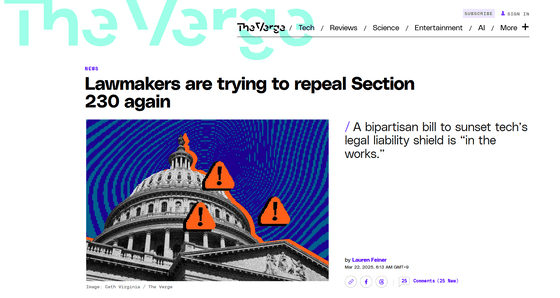It has been reported that a bipartisan bill will be submitted to repeal Section 230 of the Communications Decency Act, which has protected freedom of speech on YouTube, X (formerly Twitter), and other platforms.

It has been revealed that a bill aimed at repealing
Section 230 May Finally Get Changed as Lawmakers Prep New Bill — The Information
https://www.theinformation.com/articles/exclusive-section-230-may-finally-get-changed-lawmakers-prep-new-bill
Lawmakers are trying to repeal Section 230 again | The Verge
https://www.theverge.com/news/634189/section-230-repeal-graham-durbin

Congress Wants to Kill Section 230: Why That Law Is Important for Businesses
On March 21, 2025, foreign media outlet The Information reported, citing a congressional source familiar with the progress of the bill, that 'a bill to set Section 230 of the Communications Decency Act (hereinafter referred to as Section 230) as expiring on January 1, 2027 is expected to be introduced in Congress by Democratic Senator Dick Durbin and Republican Senator Lindsey Graham as early as late March.'
Section 230, enacted in 1996, is a provision that stipulates that providers are exempt from liability for content posted by users on platforms, such as posts on social media and content on video sites. Because this provision has protected freedom of speech on the Internet, Section 230 is also known as the '26 words that created the Internet,' after the number of words in the provision.
On the other hand, opponents of Section 230 criticize the law for giving internet companies a great deal of discretion, allowing abusive, harassing, and other illegal content to go unchecked, and conversely, for the arbitrary removal of non-illegal content.

The bill's sponsors say they don't intend to deal a devastating blow to the tech industry by completely repealing Section 230, but rather to pressure internet companies to get serious about new, more modern regulations by giving them a looming repeal date.
'The bill is intended to bring internet companies to the negotiating table. If they don't come to the table and meaningful reforms can't be agreed upon, Section 230 will ultimately be repealed,' a congressional aide told The Information.
President Trump has long intended to repeal Section 230, and in 2020, during his first administration, he signed an executive order ordering a review of Section 230 after a post by President Trump on X, then Twitter, was labeled as 'potentially misleading.'
President Trump signs executive order targeting social media for 'freedom of expression' - GIGAZINE

If Section 230 were repealed, any technology company could be subject to civil lawsuits for any content generated by internet users, which could lead to a proliferation of meritless lawsuits that could cause huge economic losses, force smaller businesses with limited financial resources to block user posts, and allow larger companies to grow even larger.
'Most lawmakers see repealing Section 230 as a punishment for tech companies,' said Adam Kovacevich, founder of the center-left tech lobbying group Chamber of Progress. 'But the reality is, without Section 230, the internet would either become a sanitized world like Disneyland, where everything has to be vetted before it's published, or it would become a world like 4chan , where there's an abdication of responsibility and nothing is vetted. I don't think either outcome is very good.'
Related Posts:
in Web Service, Posted by log1l_ks






